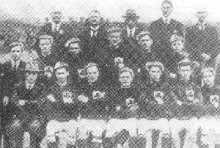The long road to the Finals
1921-1945
An outline history of Ireland in international football
Part 2 Irish Free State to "The Emergency"
A new body was formed in June 1922 called the Football Association of the Irish Free State. A number of incidents had caused the split such as the decision by the IFA not to allow the Irish Cup final replay be played in Dublin because of civil unrest, while Shelbourne refused to travel north for the match. Angry at the split, the IFA had the new association black-listed at first, but the FAIFS were given backing by the new world governing body, FIFA. From 1921 on there were irreconcilable differences between the football authorities in the North and South.
An early Ireland youth squad
In 1923, Ireland were finally formally recognized by FIFA while the International Board agreed to grant Ireland dominion status.
One year later the Irish Free State played their first senior international at the Olympics in Paris. Ireland won their opening game against Bulgaria 1-0, with a historic goal by Paddy Duncan. Unfortunately the Irish lost their next game 2-1 against Holland, but before the end of the year they had beaten both Estonia and the USA 3-1 in friendlies. In 1926 Ireland came up against the might of Italy in another friendly in Turin. The Irish were no match for the Italians and came away with a 3-0 defeat. A year later the Italians sent over their B team to play in front of over 20,000 at Lansdowne Road.
By 1931 the new FAIFS had become established and the International Board made a proposal to restrict the IFA to players from the six counties of Northern Ireland. This was defeated by the IFA, however, and it wasn't until years later that the issue was settled (in fact the issue still rumbles on, following FIFA rule changes concerning the fixity of youth international status).
The IFA also made the decision to revert back to green for their international side and ditch the blue jerseys of Saint Patrick's Athletic.
The following year Jimmy Kelly of Derry City was capped by the Irish Free State in a match against Holland. It was the first time the FAIFS had capped a player from within the IFA's jurisdiction.

The Jules Rimet Trophy
In 1934 the Irish Free State took part in their first World Cup campaign when they faced Belgium and Holland. In a remarkable first game, Ireland's Paddy Moore scored four goals, yet Ireland could only draw at home to Belgium. The Irish then travelled to Holland who beat the Irish 5-2 to dash hopes of a Finals appearance in Italy. Two years later the Irish Free State team changed its name to Ireland.
As if to ensure continuing confusion, the IFA team was also called Ireland.
Relations got even worse between the IFA and FAIFS the following season when several Northern Ireland-born players were capped by the South. Later Manchester United's Drogheda-born keeper Tommy Breen pulled out of a World Cup game for the FAIFS to play for the IFA against Scotland.
Qualification for the 1938 World Cup also ended in failure when the Irish narrowly missed out against the Norwegians. After losing the first leg 3-2 in Oslo Ireland were unable to get anything better than a draw in the return leg to leave home fans disappointed.
By the end of the decade the first international to be held in Cork was played at the Mardyke, where Ireland held Hungary to a 2-2 draw. It was Ireland's last home international before World War II broke out: they drew one-all with Germany in an away friendly in May 1939. By a curious coincidence most of their international games in the previous two years had been against teams from the countries that would soon suffer grievously under the German military machine: as well as Hungary, they played Luxembourg, France, Norway, Czechoslovakia and Poland.
Other chapters of the history:
From the Beginning
Struggling to find a role
So near and yet so far
The Charlton years
Check Ireland's international record:
1880s 1890s 1900s 1910s 1920s 1930s 1940s 1950s 1960s 1970s 1980s 1990s 2000s 2010s 2020s
Back to:
[main Ireland History page] [main World Cup page] [Bray Wanderers]

